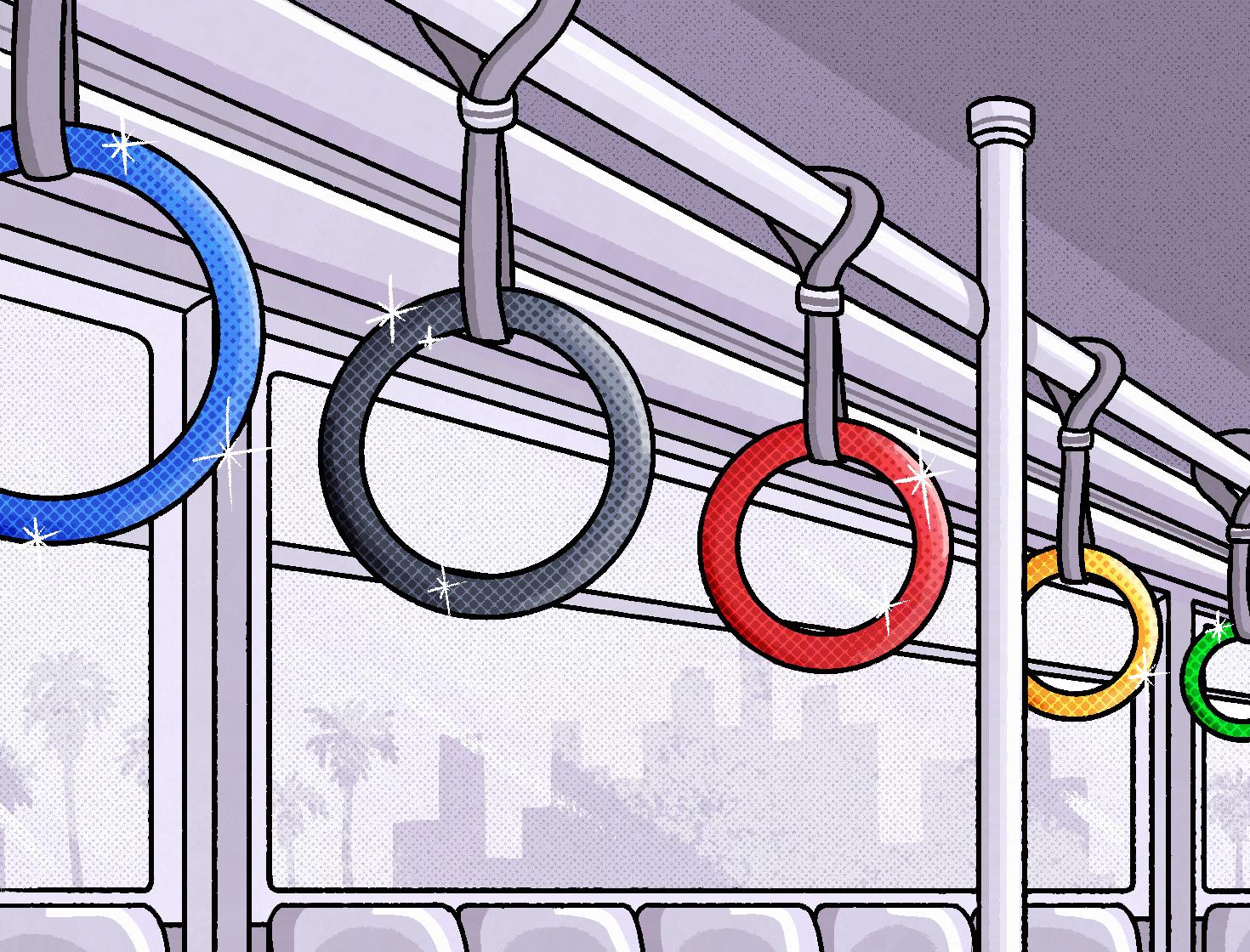Opinion: Improved public transit must elevate Angelenos ahead of 2028 Olympics
(Shimi Goldberger/Daily Bruin)
By Angelina Alkhouri
Sept. 20, 2024 8:42 p.m.
With Los Angeles set to host the 2028 Olympic Games, the city has increased its public transit expansion efforts to prepare for the arrival of thousands of visitors and athletes just four years away.
The Olympic Games are an exciting prospect that many LA residents look forward to for more than just the obvious reasons.
But although 2028 nears, LA currently lacks the public transit necessary to transport its local population, let alone host such a monumental event.
The LA Metro has spent approximately $20 billion to revamp the city’s public transit in advance of LA’s Summer Games and limit crowding and interruption. However, despite taking the long-overdue steps to overhaul the LA transit system, more work needs to be done.
This remodel is enormous compared to the preparations made for the 2024 Olympics.
The International Olympic Committee strategically selected Paris to host in 2024 for its existing facilities, which promoted sustainability and minimized environmental impact. Though it was largely a success, traffic congestion was still a difficult affair, locals’ lives were greatly disrupted, and businesses within restricted areas lost a great percentage of their turnover.
LA is infamous for its traffic congestion and inefficient public transit. This raised questions about LA’s ability to take on the upcoming 2028 Olympics.
Twenty-eight new projects have commenced to enhance transit to avoid the typical LA traffic nightmare with which many locals are well acquainted.
LA Metro has made significant progress in expanding the Purple Line with a 4-mile segment including stations at Wilshire/La Brea, Wilshire/Fairfax and Wilshire/La Cienega opening in 2025, a 2.6-mile section through Wilshire/Rodeo and Century City/Constellation opening in 2026, and a 2.56-mile section ending at Westwood/UCLA and Westwood/VA opening in 2027.
As much of the line has already been completed, these projections seem to be holding true.
“Completion of the three D Line subway extensions will facilitate a 30-minute trip from UCLA to Downtown LA – the future home of the Olympic Village,” said Dave Sotero, the media relations director of the Purple Line of LA Metro, in an emailed statement.
Sotero said the line will accommodate an anticipated 3 million attendees at the Summer Games.
“The D Line Subway Extension Project, in addition to Metro’s numerous other taxpayer-funded transportation projects now in various stages of development, will help change LA’s car culture by giving motorists many new transit alternatives to driving throughout LA County,” Soreto added in the statement.
According to Sotero’s emailed statement, the seven new stations along the new sections of the Purple Line will accommodate 78,000 new trips every day.
These projections are expected to evoke much positive change for future Angelenos as they connect big urban centers further and allow UCLA students the flexibility to navigate the city they call home.
As it currently stands, many UCLA students are unfamiliar with the transit system or have had several negative experiences attempting to make use of it.
“It’s pretty scary as a woman,” said second-year molecular, cell and developmental biology student Kate Velazquez. “I have only been on there (the bus) once, and I was cat-called.”
Velazquez, who lives in East LA, also expressed other concerns about the efficiency of the city’s public buses, which many UCLA students rely on without a nearby Metro station on campus.
“I think sometimes the bus takes really long, or it’s not as dependent as it should be,” Velazquez added.
The existing transport must be better regulated to ensure the safety of students. The long-term future of public transportation heavily depends on LA’s approach to the question of for whom these lines are built and the city’s commitment to creating a clean, safe environment.
Alliance for Community Transit LA is a coalition of organizations that engage with LA Metro to expand bus services, especially for low-income riders, and to improve travel options to ensure transit justice for all.
“Transit projects are beneficial, so long as they are built around the needs of the people who live in Los Angeles and so long as they are permanent,” said Marissa Ayala, ACT LA’s policy and advocacy manager.
This multifaceted opportunity has the potential to be exactly what the city needs. However, the city must be kept in check to ensure the project remains equitable, enduring its development.
Leveraging the attention to improve the lives of Angelenos should be the primary focus, Ayala added.
“We are now focusing our efforts to improve the customer experience on transit that will help bring a new generation of public transit riders to the system and help reduce automobile dependency in our region,” Sotero said.
Perhaps the Olympics being hosted in LA in 2028 will bring more than just an economic boost and global rivalry and camaraderie.
Perhaps, it will also lead to the necessary development of our transportation system that will improve the lives of Angelenos for decades to come.
